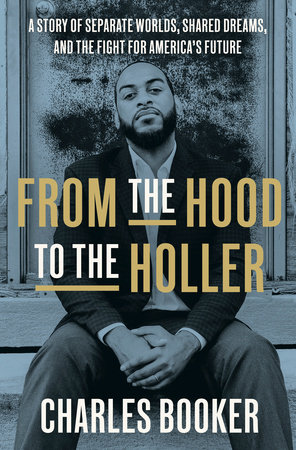From the Hood to the Holler Reader’s Guide
By Charles Booker


1. How would you describe From the Hood to the Holler in one or two sentences? What message or messagesdoes it convey?
2. Charles Booker tells the story of his life, and why he became a public servant. Which part of his journeyresonated with you most, and why?
3. Family plays a vital role in Booker’s life: “A core value in our family was that we fought for one another.We always had one another’s backs. . . . When you are raised with such a deep connection to family, youunderstand the importance of selflessness, communication, loyalty, and love.” How has family helpedyou in your life? A parent, a sibling, a grandmother, an uncle, a cousin? Does anybody go above andbeyond? How so? What values does your family believe in?
4. Booker’s mother is a powerful, memorable presence in this memoir. What three words would you use todescribe her, and why?
5. Booker and his extended family faced many challenges below the poverty line. But he says “you couldnever have convinced me that poor was a term that remotely applied to us. . . . even when we didn’thave a house, we always had a home.” What do you think this passage says about Charles Booker? Whatspecific experiences in his early life motivated him?
6. What do you think it means to dedicate your life to public service? Why does the profession of politician—public servant—often get such a bad reputation? How do you think public servants should counterthis perception?
7. Alongside family, the author has another cornerstone in his life: “The main reason we were able to survivethe toughest of times was our strong foundation of faith.” In your view, how does faith help or hindera person or a community? If comfortable, describe your relationship to faith. What role should a churchplay in public life?
8. Booker discusses the fallacy of “urban renewal,” which isolated Black communities across the country.In Louisville, a high-traffic thoroughfare was erected, “creating a barrier that walled off the Black communityfrom the rest of the city.” Then a “predatory real-estate practice known as blockbusting was usedto drive out the remaining white homeowners, and the whole area was redlined by banks and insurancecompanies, starving it of the investment and mortgage capital a functioning community needs.” This isjust one example of systemic racism. Who benefits from denying this long-entrenched problem exists,and why?
9. “When I started filling out my college applications and applying for scholarships,” Booker writes, “I hadno idea what I wanted to major in. I only knew that I wanted to be an advocate for communities like myown.” What causes are you passionate about and what sort of actions have you taken for that cause?How does volunteering make someone a better person?
10. Booker wasn’t looking for a relationship when Tanesha entered the picture. Their bond was not immediate,more casual. There are many types of love stories in the world. What made this one so special?
11. “Leadership is not about being the most important person in the room,” says Booker. What does thissentiment mean to you? What qualities, in your mind, make a great leader?
12. Booker learned a lot by observing the inner workings of local politics, “watching government in action.”While State Senator Gerald Neal held back or restrained his answers to avoid conflict, CongressmanJohn Yarmuth was always direct, saying exactly what he felt. Which approach do you prefer, and why?
13. What has your experience been with local government, if any? What are the benefits of a strong localgovernment and engaged community?
14. When Booker started at Kentucky’s Department of Fish and Wildlife, he says, “People regarded me asan outsider.” What experience have you had as an outsider and how did you manage it?
15. “The first time I paused to look at the Appalachian Mountains,” writes Booker, “I felt the pride thatfolks in Pikeville and Prestonsburg have known their whole lives. I was just as proud of the West Endof Louisville, but the scenery here was unmatched. The hills surround you, towering along the roadsand creating the bends that reveal large valleys surrounded by tree-covered mountains.” What are yourfavorite natural wonders in your state? What places have you visited that left you in awe, and why?
16. Whether in a corporate culture or an underserved community, low morale makes matters worse. Whatdo you think are some keys to boosting morale in such situations?
17. On Booker’s first day as a project manager for the Louisville mayor’s Innovation Delivery Team, TedSmith, a chief officer for Mayor Greg Fischer, says: “All right, everyone. We’ve been focusing on issuesof neighborhood blight, overcrowding in our jails, neighborhood Wi-Fi, and vacant lots. What ideas doyou have? Dream big!” What would your ideas be for your community?
18. When Senator Neal asks Booker if he had ever thought about running for office, a seed is planted. “Ieven started planning my policy platform and my brand, including my campaign colors.” If you wereto run for office what would your campaign colors be and why? Describe your platform in a couple ofsentences.
19. Booker has had to confront a lot of adversity in his life—the toll of diabetes; the loss of his grandmother;election defeat and job loss; the death of his cousin to gun violence—but he always made itthrough. How can his example help others in times of trouble?
20. The book ends with Charles Booker’s hard-fought race to win the Democratic primary and take on SenatorMitch McConnell. He was not the Democratic Party’s choice and faced an uphill battle againstthe well-funded Amy McGrath. But thanks to a debate performance that went viral, Booker’s campaigncaught fire, only to fall short by 2.8% when all the votes were counted. What do you think was the biggest takeaway from Booker’s campaign?
Just for joining you’ll get personalized recommendations on your dashboard daily and features only for members.
Find Out More Join Now Sign In